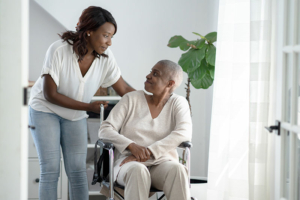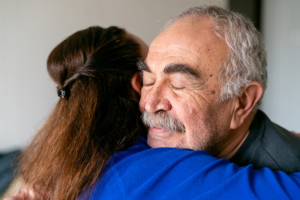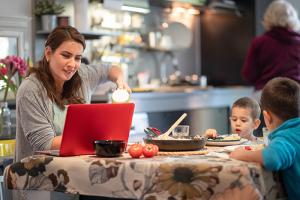Yes, You Can Continue Your Career While Caring for Your Parents!

Caring for your parents doesn’t have to mean sacrificing your career!
Though we may dread the alarm going off on Monday mornings, having a career outside of the home is extremely important for many of us. It is a big component of our identity, signifying the time and effort we’ve invested throughout the years and accomplishments we’ve achieved. So what happens when your parents are starting to show signs of needing assistance to continue living safely at home? Will you face a choice between a career you love and caring for your parents?
Thankfully, there are steps you can take to ensure quality care for your parents without sacrificing your professional goals and aspirations. Here are a few to think about:
- Include Technology: Technology can ease caregiving tasks, allow you to stay linked to loved ones and much more. If you can imagine it, it’s likely there’s an app for it! Research tech tools to help bridge the gap between career responsibilities and caregiving duties. From medication reminders to virtual support groups, technology can bring more efficiency to the care you’re providing.
- Seek Support: Remember, you don’t need to do it all alone. Reach out to other loved ones, friends, and Responsive Home Care for assistance. You will be amazed at the resources and support available once you ask for help, allowing you to focus on your career with peace of mind. Building a good support network can provide emotional encouragement, practical assistance, and valuable insights, empowering you to navigate the complexities of caregiving while pursuing your professional goals.
- Explore Flexible Work Arrangements: Many employers offer flexible work arrangements, like flexible hours or telecommuting, to support workers with caregiving responsibilities. Explore these possibilities with your employer to find a schedule that works for both your career and your caregiving duties. This will help you find a healthier balance with your personal and professional life, allowing you to excel in both areas.
- Don’t Neglect Self-Care: Don’t forget to prioritize your own wellbeing in the middle of the demands of caregiving and your career. Take some time for self-care activities that restore your mind, body, and spirit. Whether it’s a leisurely walk in the park or a relaxing bubble bath, investing in yourself will ultimately make you a better caregiver and professional.
- Take Advantage of Community Resources: Make full use of community resources and services intended to support caregivers. From adult day programs to respite care services, these resources can provide much-needed relief and assistance. By tapping into these resources, you can lighten your load and ensure your parents receive the very best care possible while you take care of your other responsibilities.
Caring for your parents while pursuing a profession is undoubtedly challenging, but it’s far from impossible. Contact Responsive Home Care and let’s work together to create a schedule for care that enables you to continue in your career while your parents thrive as well. Serving Fort Lauderdale, Plantation, Deerfield Beach, and the nearby communities, we’re just a phone call away at 954-486-6440.




 Everyone goes through good days and bad days, and everyone is entitled to negative thinking or irritability every now and then. If you are caring for an older adult who appears to have fallen into a routine of continual negativity and complaining, there could be a reason for it. It’s worthwhile to explore whether or not a health issue may be the culprit for negative mood changes in a senior.
Everyone goes through good days and bad days, and everyone is entitled to negative thinking or irritability every now and then. If you are caring for an older adult who appears to have fallen into a routine of continual negativity and complaining, there could be a reason for it. It’s worthwhile to explore whether or not a health issue may be the culprit for negative mood changes in a senior.





